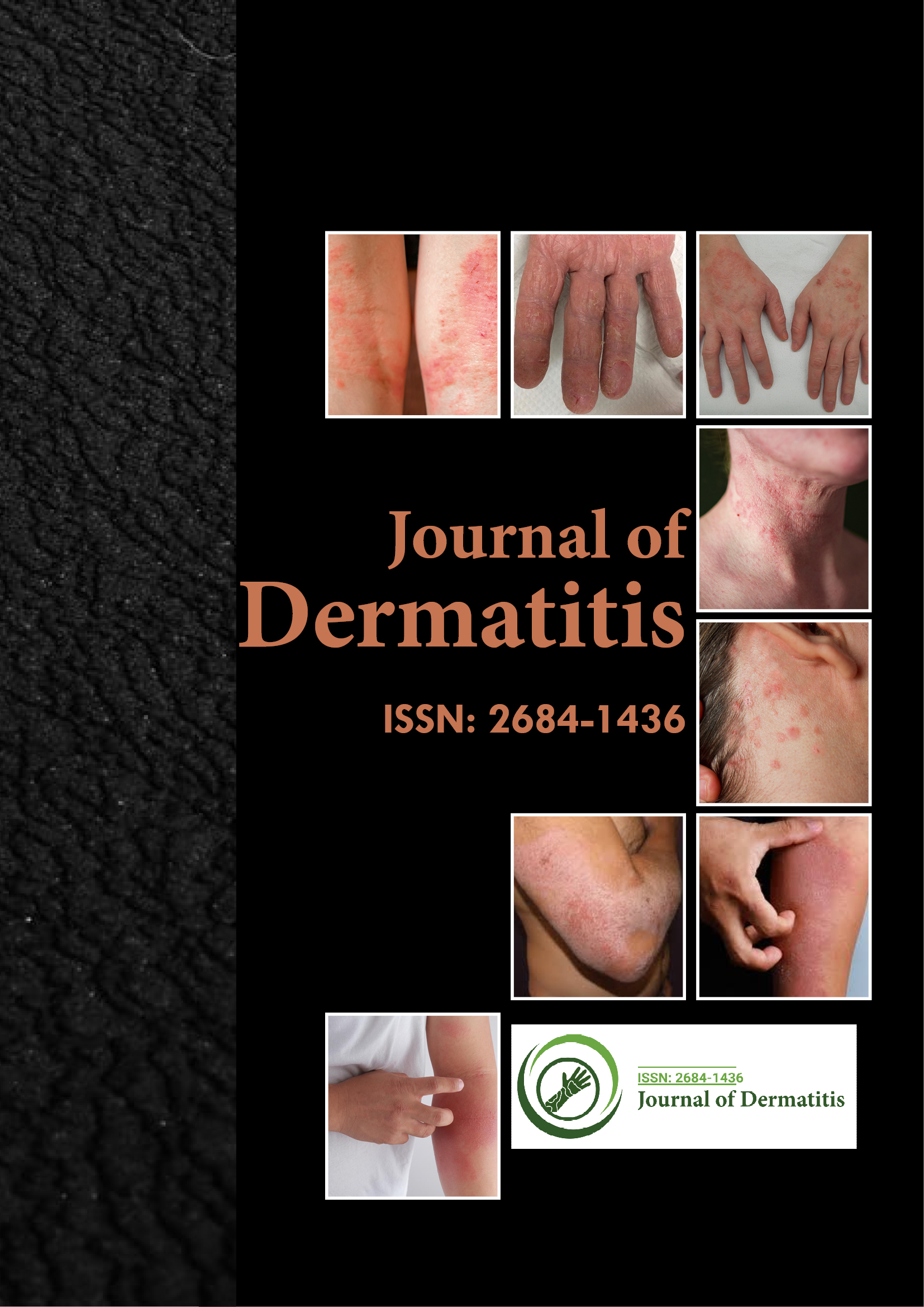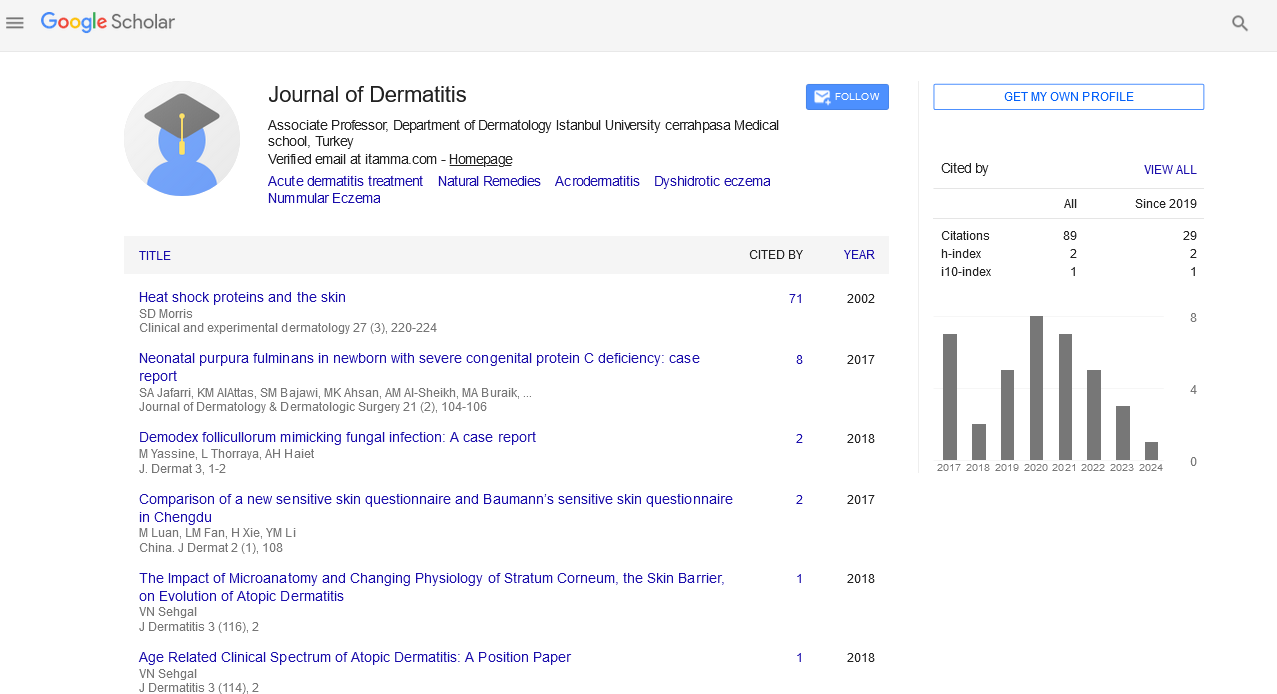Indexed In
- RefSeek
- Hamdard University
- EBSCO A-Z
- Euro Pub
- Google Scholar
Useful Links
Share This Page
Journal Flyer

Open Access Journals
- Agri and Aquaculture
- Biochemistry
- Bioinformatics & Systems Biology
- Business & Management
- Chemistry
- Clinical Sciences
- Engineering
- Food & Nutrition
- General Science
- Genetics & Molecular Biology
- Immunology & Microbiology
- Medical Sciences
- Neuroscience & Psychology
- Nursing & Health Care
- Pharmaceutical Sciences
Commentary - (2023) Volume 8, Issue 2
The Role of Proteins in Causing Skin Allergies and Irritation
Adriana Rendon*Received: 01-Mar-2023, Manuscript No. JOD-23-20851; Editor assigned: 03-Mar-2023, Pre QC No. JOD-23-20851 (PQ); Reviewed: 20-Mar-2023, QC No. JOD-23-20851; Revised: 27-Mar-2023, Manuscript No. JOD-23-20851 (R); Published: 03-Apr-2023, DOI: 10.35248/2684-1436.23.8.190
Description
Urticaria, also known as hives, and dermatitis, also known as eczema, are two common skin conditions that can cause itching, redness, and swelling. While there are many causes of these conditions, including environmental factors and genetics, recent research has focused on the role of protein in the development and exacerbation of urticaria and dermatitis. Protein can be found in a variety of foods, and some proteins have been identified as potential triggers for urticaria and dermatitis. The following are some of the protein causes of urticaria and dermatitis.
Food proteins
Certain food proteins have been linked to urticaria and dermatitis in some individuals. The most common food proteins that have been associated with these conditions include milk, eggs, peanuts, soy, and wheat. The exact mechanism by which food proteins cause urticaria and dermatitis is not fully understood. However, it is thought that these proteins can trigger an immune response in susceptible individuals, leading to the release of histamine and other inflammatory mediators. In some cases, elimination diets that exclude specific food proteins have been shown to be effective in reducing symptoms of urticaria and dermatitis.
Pollen related food proteins
Individuals with seasonal allergies may also be susceptible to urticaria and dermatitis triggered by certain pollen-related food proteins. For example, individuals with birch pollen allergies may experience symptoms after eating certain fruits and vegetables, such as apples, pears, and carrots.
These pollen-related food proteins are thought to cause symptoms through a process known as oral allergy syndrome. In this process, the immune system mistakes certain proteins in the food for the pollen proteins and triggers an allergic reaction.
Animal proteins
Animal proteins, such as those found in meats and dairy products, have also been linked to urticaria and dermatitis in some individuals. The exact mechanism by which animal proteins cause these conditions is not fully understood, but it is thought that they may trigger an immune response or act as an irritant. Some studies have suggested that avoidance of certain animal proteins, such as those found in beef and pork may be beneficial for individuals with urticaria and dermatitis.
Gluten proteins
Gluten is a protein found in wheat, barley, and rye. While gluten sensitivity is commonly associated with gastrointestinal symptoms, some individuals with gluten sensitivity may also experience urticaria and dermatitis. The exact mechanism by which gluten causes these conditions is not fully understood. However, it is thought that gluten may trigger an immune response or act as an irritant. In some cases, elimination diets that exclude gluten have been shown to be effective in reducing symptoms of urticaria and dermatitis.
Protein contact dermatitis
Protein contact dermatitis is a type of dermatitis caused by direct contact with certain proteins. This condition is commonly seen in individuals who work with certain proteins, such as those found in latex or animal products. The exact mechanism by which protein contact dermatitis develops is not fully understood. However, it is thought that the proteins can penetrate the skin and trigger an immune response. Prevention of protein contact dermatitis involves avoiding direct contact with the proteins that cause the condition.
In conclusion, protein can be a potential cause of urticaria and dermatitis. While the exact mechanisms by which protein triggers these conditions are not fully understood, it is important for individuals with these conditions to identify and avoid protein triggers that may exacerbate their symptoms. Working with a healthcare provider or allergist to identify specific protein triggers and develop a management plan is essential for individuals with urticaria and dermatitis.
Citation: Rendon A (2023) The Role of Proteins in Causing Skin Allergies and Irritation. J Dermatitis.8:190.
Copyright: © 2023 Rendon A. This is an open-access article distributed under the terms of the Creative Commons Attribution License, which permits unrestricted use, distribution, and reproduction in any medium, provided the original author and source are credited.

